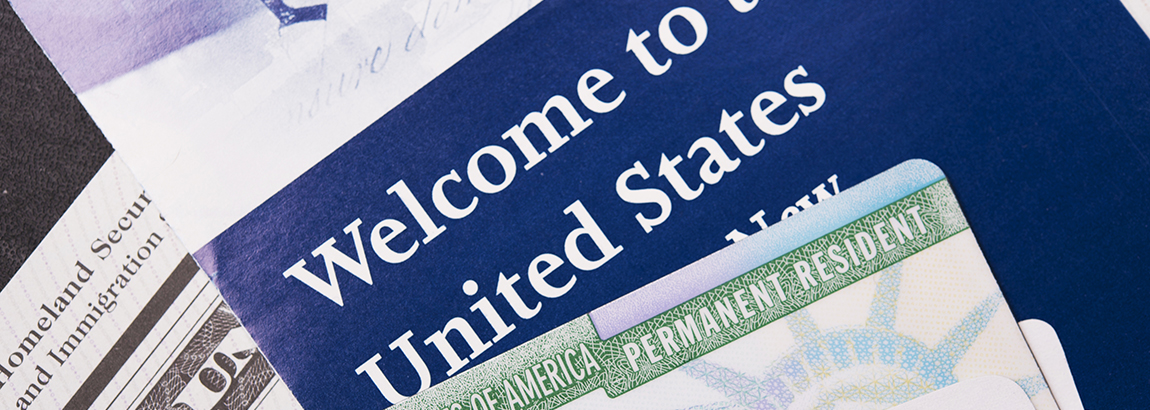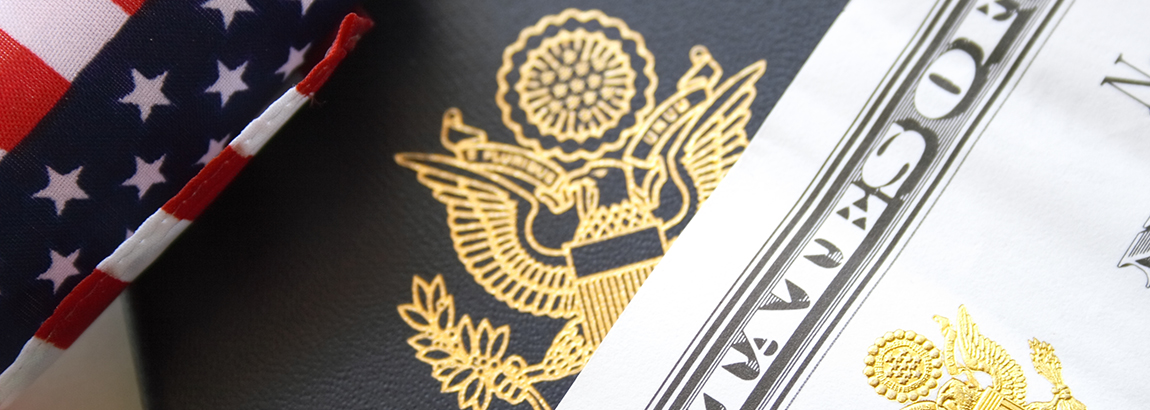Kolko & Casey, P.C. is a full service immigration and naturalization law firm providing professional legal services to individuals and businesses throughout Colorado, the Rocky Mountain West, the United States, and the World. Our professional staff speaks English, Spanish, Korean, and Portuguese and we can arrange for translators in any other language.
Adjustment of Status and Consular Processing
The INA provides an individual with two primary paths to permanent resident status: adjustment of status in the United States, and consular processing outside of the United States.
Adjustment of Status
The Immigration and Nationality Act (INA) permits the change of an individual's immigration status while in the United States from nonimmigrant to immigrant if the individual was inspected and admitted or paroled into the United States and is able to meet all required qualifications for a green card in a particular category. This process permits an eligible individual to obtain permanent resident status without having to return to his/her home country to complete visa processing.
The common term for a change to permanent status inside the USA is “adjustment of status.”
The first step in the adjustment of status process is to determine if you fit into a specific immigrant category. Most immigrants become eligible for a green card through a petition filed on your behalf by a family member or employer. Others become permanent residents through first obtaining refugee or asylum status, or through a number of other special provisions, including extraordinary accomplishments or investors.
Consular Processing
Consular processing is an alternate process for an individual who is outside the United States, or who is in the United States but is ineligible to adjust status for various legal reasons. In this process, a person obtains the Immigrant Visa abroad and enter the United States as a permanent resident.
The first step in consular processing is to determine if you fit into a specific immigrant category. Most immigrants become eligible for a green card through a petition filed on your behalf by a family member or employer. Others become permanent residents through first obtaining refugee or asylum status, or through a number of other special provisions.
Diversity Visa Lottery
Diversity Visa Lottery:
The Diversity Immigrant Visa Program is a United States congressionally mandated lottery program for receiving a United States Permanent Resident Card. It is also known as the Green Card Lottery.
The Diversity Immigrant Visa Program makes 50,000 diversity visas available annually, drawn from random selection among entries of individuals who are from countries with low rates of immigration to the United States.
Citizens of some countries are not eligible to apply for the diversity lottery. This is determined by whether or not specific countries sent a total of more than 50,000 immigrants to the United States in the previous five years. These countries change every year and are determined by the U.S. Department of State.
To be eligible for the Diversity Lottery Program, you should have either a high school education, its equivalent, or two years work experience within the last five years in a job which demands two years training.
Labor Certification
Some employment-based immigrant visa preferences require a job offer from a U.S. employer prior to filing.
This employer is considered a sponsor.
For some visa categories, before the U.S. employer can submit an immigration petition to United States Citizenship and Immigration Services on behalf of the alien, the employer must first prepare and obtain an approved labor certification from the U.S. Department of Labor (DOL).
Labor certification is granted only in those cases where the employer can demonstrate that qualified U.S. workers are not able, available, and/or unwilling to accept employment in that position.
The U.S. Department of Labor reviews the application and determines if all the key elements in the application are acceptable.
If U.S. Department of Labor finds that the employer’s application is unduly restrictive or has excessive minimum requirements it will contact the employer. If everything is acceptable, the U.S. Department of Labor will certify the application.
A Summary of the 5 Steps in the Employment Based Green Card Process is available at:
A more detailed narrative explanation of the Labor Certification and Employment Based Green Card Process is attached here.
Investor Based Permanent Residency
EB- 5 - Fifth Preference - Employment Creation Investors
The fifth employment-based preference is set-aside for alien investors in new commercial enterprises or troubled businesses, who seek to obtain permanent residency.
With the 1990 Immigration Act, Congress has kept aside up to 10,000 immigrant visas per year just for alien investors in new commercial enterprises, who will create employment for at least ten individuals. Historically, these immigrant visas have remained available each year, as there have been less than 10,000 approved each year.
Qualified EB-5 Investors generally receive approval as a Conditional Permanent Resident for 2 years, and then must confirm they remain qualified. Prior to the end of the 2-year conditional approval, an additional process is required in order for the Investor to confirm that the investment remains quailed, at which time the conditions are removed.
EB-5 cases are highly complex and require careful planning and legal advice.
There are two investor groups under the program:
- Those who invest $1,000,000 in other areas, and create or save at least 10 new full time jobs in the United States.
- People who invest at least $500,000 in "targeted employment areas" (rural areas or areas experiencing high unemployment of at least 150% of the national average) and those who invest $1,000,000 in other areas, and who create or save at least 10 new full time jobs in the United States.
A Regional Investment Center
EB-5 Investors can also invest in a United States Citizenship and Immigration Center designated Regional Investment Center (RIC).
A Regional Investment Center is defined as any economic unit, public or private, which is involved with the promotion of economic growth, improved regional productivity, job creation, and increased domestic capital investment. Basic requirements for RIC include that the organization must be an:
- An entity, organization or agency that has been approved as such by United States Citizenship and Immigration Services;
- Focuses on a specific geographic area within the United States; and
- Seeks to promote economic growth through increased export sales, improved regional productivity, creation of new jobs, and increased domestic capital investment.
Regional Investment Centers have several advantages, including prior approval from USCIS as a “qualified center” from USCIS. In addition, the Investor is not required to create a new entity, or work directly for the investment entity. The investor only needs to have limited involvement and oversight, can work at other independent locations, and is not directly responsible for job creation.
There are over 600 Current Immigrant Investor Regional Centers that have been approved by USCIS.
For more information about Investor based Permanent Residency, please contact Kolko & Casey, P.C. to schedule a consultation.
Employment Based Permanent Residency
Employers in the United States cannot always find the skilled workers they need among jobseekers. Because of this, U.S. immigration law allows employers to sponsor certain employees with specific skills and talents to become lawful permanent residents. However, bringing the people that U.S. businesses need requires careful strategy and planning.
To become a permanent resident based on a permanent employment opportunity in the United States, or if an employer wants to sponsor a person for lawful permanent residency based on permanent employment in the United States, there is a multi-step process.
- Foreign nationals and employers must determine if the foreign national is eligible for lawful permanent residency under one of USCIS’ paths to lawful permanent residency. This is a complex analysis that should be handled with care. Please contact Kolko & Casey, P.C. to set up a consultation to determine whether the foreign national is eligible for employment-based lawful permanent residence.
- Most employment categories require that the U.S. employer complete a Labor Certification request with the U.S. Department of Labor to show that there are not enough U.S. workers who are able, willing, qualified, and available in the geographic area where the immigrant is to be employed and that no American workers are displaced by foreign workers. The labor certification process is commonly known as PERM. There are certain categories that waive the PERM Labor Certification requirement such as National Interest Waiver (NIW), Extraordinary Ability, Outstanding Professor of Researcher and Multinational Manager and Executive.
- USCIS must approve an immigrant visa petition for the person wishing to immigrate to the United States. Some applications require a permanent position and others do not. Some require the employer to petition for permanent resident status other categories allow the individual to self-petition.
- The U.S. State Department must give the applicant an immigrant visa number, even if the applicant is already in the United States. When the applicant receives an immigrant visa number, it means that an immigrant visa has been assigned to the applicant.
- If the applicant is already in the United States, he or she must apply for adjustment of status to become a lawful permanent resident after a visa number becomes available. If the applicant is outside the United States when an immigrant visa number becomes available, he or she will be notified and must complete the process at his or her local U.S. consulate office abroad.
Preference Categories
The Immigration and Nationality Act provides a yearly minimum of 140,000 employment-based immigrant visas which are divided into four (4) preference categories. They may require a Labor Certification from the U.S. Department of Labor (DOL), and the filing of a petition with United States Citizenship and Immigration Services in the Department of Homeland Security (USCIS).
Employment First Preference (EB1)
Priority Workers receive 28.6 percent of the yearly worldwide limit. All Priority Workers must be the beneficiaries of an approved Form I-140, Immigrant Petition for Foreign Worker, filed with USCIS.
Within this preference there are three sub-groups:
- Persons of extraordinary ability in the sciences, arts, education, business, or athletics. Applicants in this category must have extensive documentation showing sustained national or international acclaim and recognition in the field of expertise. This category is reserved for those individuals who have risen to the very top of their field. Applicants in the extraordinary ability category are not required to have a specific job offer so long as they are entering the U.S. to continue work in the field in which they have extraordinary ability.
- Outstanding professors and researchers with at least three years of experience in teaching or research, who are recognized internationally. No labor certification is required for this classification, but the prospective employer must provide a job offer and file a petition with USCIS.
- Certain executives and managers who have been employed at least one of the three preceding years by the overseas affiliate, parent, subsidiary, or branch of the U.S. employer. The applicant must be coming to work in a managerial or executive capacity. No labor certification is required for this classification, but the prospective employer must provide a job offer and file a petition with USCIS.
Employment Second Preference (EB2)
Professionals Holding Advanced Degrees, or Persons of Exceptional Ability in the Arts, Sciences, or Business receive 28.6 percent of the yearly worldwide limit, plus any unused Employment First Preference visas.
All Second Preference applicants must have a labor certification approved by the Department of Labor, or Schedule A designation, or establish that they qualify for one of the shortage occupations in the Labor Market Information Pilot Program.
A job offer is required and the U.S. employer must file a petition on behalf of the applicant.
Certain foreign nationals may qualify for a National Interest Waiver (NIW), in order to obtain an exemption from the job offer and labor certification if the exemption would be in the United States’ national interest. If the NIW is approved, the I-140 petition will be processed without a job offer or labor certification.
There are two subgroups within this category:
- Professionals holding an advanced degree (beyond a baccalaureate degree), or a baccalaureate degree and at least five years progressive experience in the profession; and
- Persons with exceptional ability in the arts, sciences, or business. Exceptional ability means having a degree of expertise significantly above that ordinarily encountered within the field.
Employment Third Preference (EB3)
Skilled Workers, Professionals Holding Baccalaureate Degrees and Other Workers receive 28.6 percent of the yearly worldwide limit, plus any unused Employment First and Second Preference visas.
All Third Preference applicants require an approved I-140 petition filed by the prospective employer. All such workers require a labor certification, or “Schedule A” designation, or evidence that they qualify for one of the shortage occupations in the Labor Market Information Pilot Program.
There are two subgroups within this category:
- Skilled workers are persons capable of performing a job requiring at least two years’ training or experience; and
- Professionals with a bachelor’s degree.
Special Immigrants (EB4)
Over the years, several laws have been passed covering special categories of immigrants who qualify for Lawful Permanent Residence, these include, but are not limited to, Religious Workers, Former Employees of the Panama Canal Zone, Former Employees of the U.S. Government and U.S. Armed Forces, Retired Employees of International Organizations, Retired Civilians on NATO-6 visa, Employees of the International Broadcasting Bureau, Special Agricultural Workers and Foreign Medical Graduates.
If you believe that you or your family member falls into one of these Special Immigrant categories, please contact Kolko & Casey, P.C. for a consultation.

 Call us today:
Call us today: 





